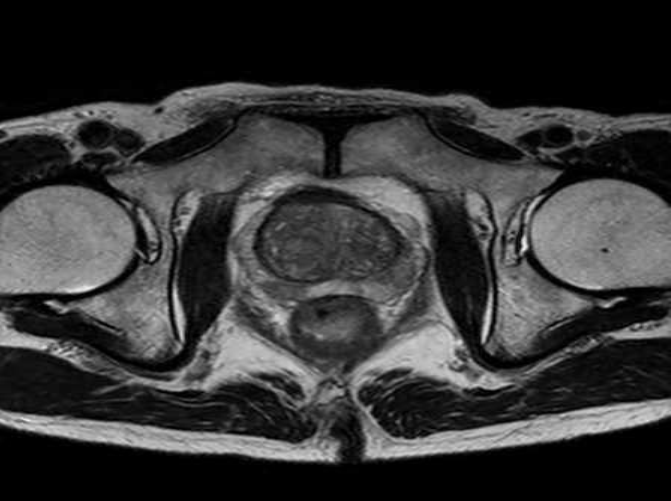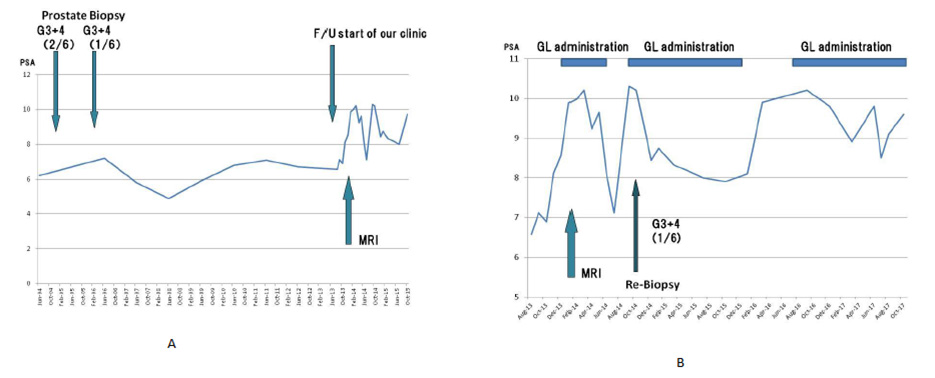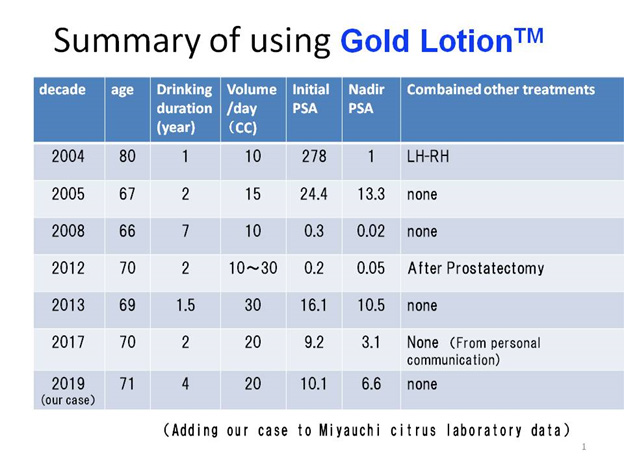Review and Case Report: Active Surveillance Therapy with Citrus-Peel Extracts’ Efficacy Against Prostate Cancer
Introduction
Prostate cancer is the most common cancer for men in Japan. It usually grows very slowly. Most men who develop prostate cancer are older than 65 years and do not die from the disease since prostate cancer usually grows very slowly [1]. The withdrawal rate from active surveillance therapy to a second (traditional) therapy is said to be 14 – 41% [2]. During active surveillance therapy, patients feel uneasiness for not taking any traditional medications. Some of them thus turn to noninvasive therapy such as complementary and alternative medicine (CAM) [3].
Case Report
This is a case of a 76-year-old male. Because his PSA value rose to 6.4 ng/mL at the age of 61, he was recommended a prostatic biopsy by other doctors. According to the pathological examination, two out of six specimens indicated G3+4. CT and bone scintigraphy revealed his stage was T2aNoMo. This patient chose active surveillance therapy. Obvious changes were not observed for about nine years; however, in 2014 his PSA value gradually increased to over 10 ng/mL. Then he started drinking citrus-peel extract known as GL among researchers (Gold Lotion produced by Miyauchi Citrus Research Center, Ltd., Takasaki, Japan) as a CAM therapy. We recommended another biopsy to him to be assured of no prostate cancer progression. The patient under active surveillance was a little anxious about receiving no traditional medical treatment, so that careful follow-up of PSA levels was required. Although the PSA level was rising, MRI examination did not indicate obvious abnormal lesions. The patient heard about GL by word of mouth and was willing to try it out on him. One-year drinking of GL showed no abnormal results in MRI, except for prostatic adenoma (Figure 1). His PSA increased to 11.2 ng/mL. He decided to have another biopsy. Collected specimens showed no sign of progression in Gleason score but a small number of cancer cells (one out of six specimens with G3+4) in September 2015. He decided to continue active surveillance therapy with GL. As of November 2017, his PSA value remained less than 11 ng/mL for about 4 years despite small interruption periods of GL drinking (Figures 2A & 2B).
Figure 1: MRI showed large prostate adenoma; however, the margin is smooth with no lymph node swelling.
Figure 2: Clinical course of this patient
A. From the initinal diagnosis from 2006 to 2014,
B. Afer GL drinking period from 2014 to 2019.
Discussion and Conclusion
Complementary and alternative medicine (CAM) is a form of treatment used in addition to or instead of standard therapy. Standard treatments go through a long and careful research process to prove they are safe and effective, but less is known about most types of CAM. In the treatment of advanced-stage cancer, CAM is carried out as palliative therapy, about which the National Institute of Health (NIH) provides precise information on their website: calcium, green tea [4], lycopene, pomegranate, selenium and vitamin E, soy, and modified citrus pectin. Selenium and vitamin E are probably two of the most popular dietary supplements being considered for their use in the reduction of prostate cancer risk. Thirty-six percent of cancer patients in Hawaii used CAM [5]. GL, containing citrus pectin, also contains a high amount of nobiletin which is effective against prostate cancer cells, according to an in vivo nude mouse study [6]. Furthermore, GL contains other polymethoxyflavones (PMFs), exerting beneficial effects through antigrowth, antiangiogenesis, and cell cycle arrest commands or mediate signals to live or die by apoptosis.
Treatment with GL by both intraperitoneal (i.p.) injection and oral administration dramatically reduced both weights (57%-100% inhibition) and volumes (78%-94% inhibition) of the tumors without any observed toxicity. These inhibitory effects were accompanied by mechanistic down-regulation of the protein levels of inflammatory enzymes (inducible nitric oxide synthase, iNOS and cyclooxygenase-2, COX-2), metastasis (matrix metallopeptidase-2, MMP-2 and MMP-9), angiogenesis (vascular endothelial growth factor, VEGF), and proliferative molecules, as well as by the induction of apoptosis in prostate tumors [7]. Recent research showed flavonoid has a useful compound to prevent proliferation and migration of prostate cancer cells through PI3K/ Akt/NFkB signaling [8]. Among other GL cases, some patients showed favorable clinical results (Figure 3).
Figure 3: List of patients who used GL and clinical and results (supported by Miyauchi citrus laboratories).
During active surveillance therapy, particularly for the patient who often tends to develop anxiety [9], CAM was a useful method to get rid of his anxiety. Although it is unknown whether the rise in PSA when starting to drink GL was due to cancer progression, there was no deterioration in his urination condition nor an increase in the amount of residual urine that indicates the progression of cancer [10]. The rise in PSA may be assumed to be an indication of progression. However, after the start of GL oral administration, his serum free testosterone level stayed normal; therefore, the effect on the endocrine system seems low. Hence, it is my opinion that subsequent treatments shall not be negatively influenced by the use of GL. In conclusion, in some limited cases, the addition of GL to Active Surveillance therapy can be considered as an effective method to eliminate patients’ anxiety, and some anticancer effects can be expected.
For more Articles on: https://biomedres01.blogspot.com/






No comments:
Post a Comment
Note: Only a member of this blog may post a comment.